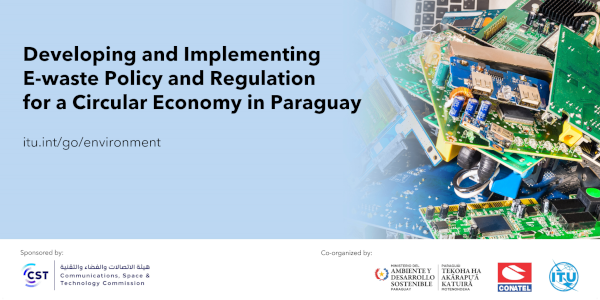
Background
In Paraguay, the management of e-waste is referred to in the Integrated Waste Management Law, which proposed a national waste management system encompassing e-waste. The overarching law outlines principles and responsibilities for prevention, reduction, reuse, recycling, treatment and final disposal of waste. ITU is supporting the Government of the Republic of Paraguay in the development of dedicated e-waste regulations.
The development of Paraguay's e-waste regulatory framework is part of a two-years project with the Communications, Space and Technology Commission (CST), which aims for the sound implementation of national e-waste policy and regulations in Paraguay, Rwanda and Zambia. In Paraguay, regulatory developments will be coordinated through a series of thorough consultations with the public and private sectors, as well as through engagement sessions with relevant stakeholders.
This Private Sector Stakeholder Consultation Workshop is the second consultation workshop organized for regulatory development and agreement on an EPR implementation roadmap for e-waste management in Paraguay.
Objectives
This consultation workshop will offer the opportunity to gather technical inputs from private sector stakeholders on the legal, administrative, and financial modalities of the management of e-waste in Paraguay by:
- Introducing private sector participants to basics and key elements of e-waste and circular economy
- Presenting the key aspects based on which the first version of the WEEE Regulation draft was built
- Acquainting the private sector participants to the CST-ITU project and in implementing extended producer responsibility (EPR)
- Identifying best practices including the possible financing mechanisms, roles and responsibilities and barriers to be overcome to enhance public-private sector cooperation and to achieve optimal management of e-waste in the future.